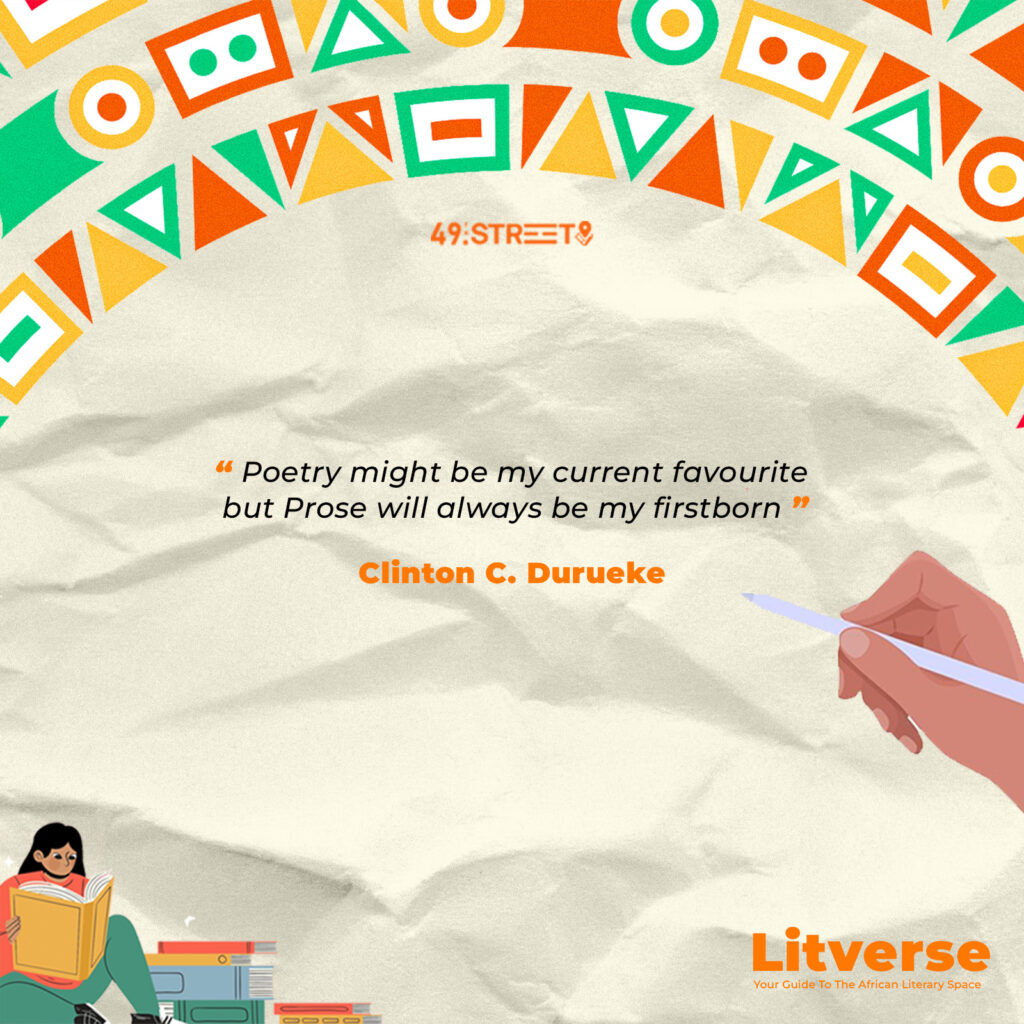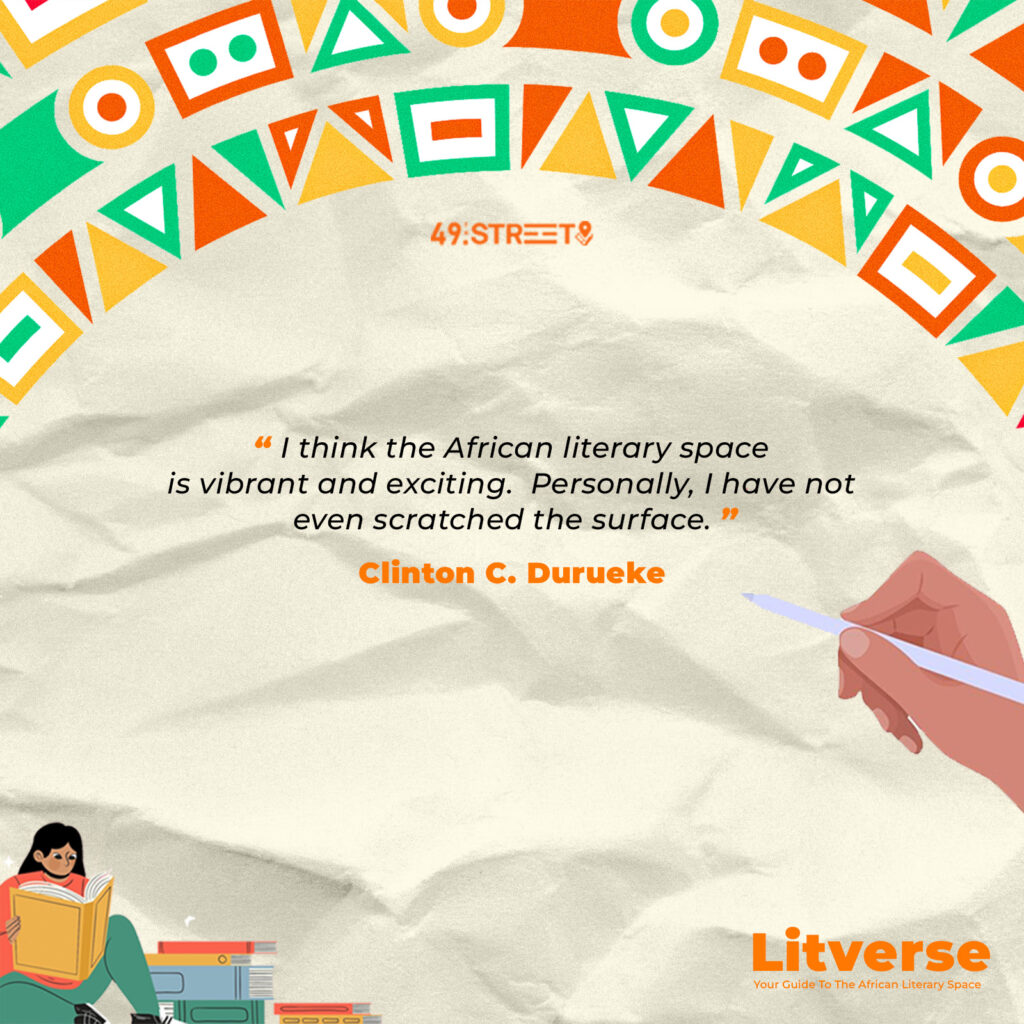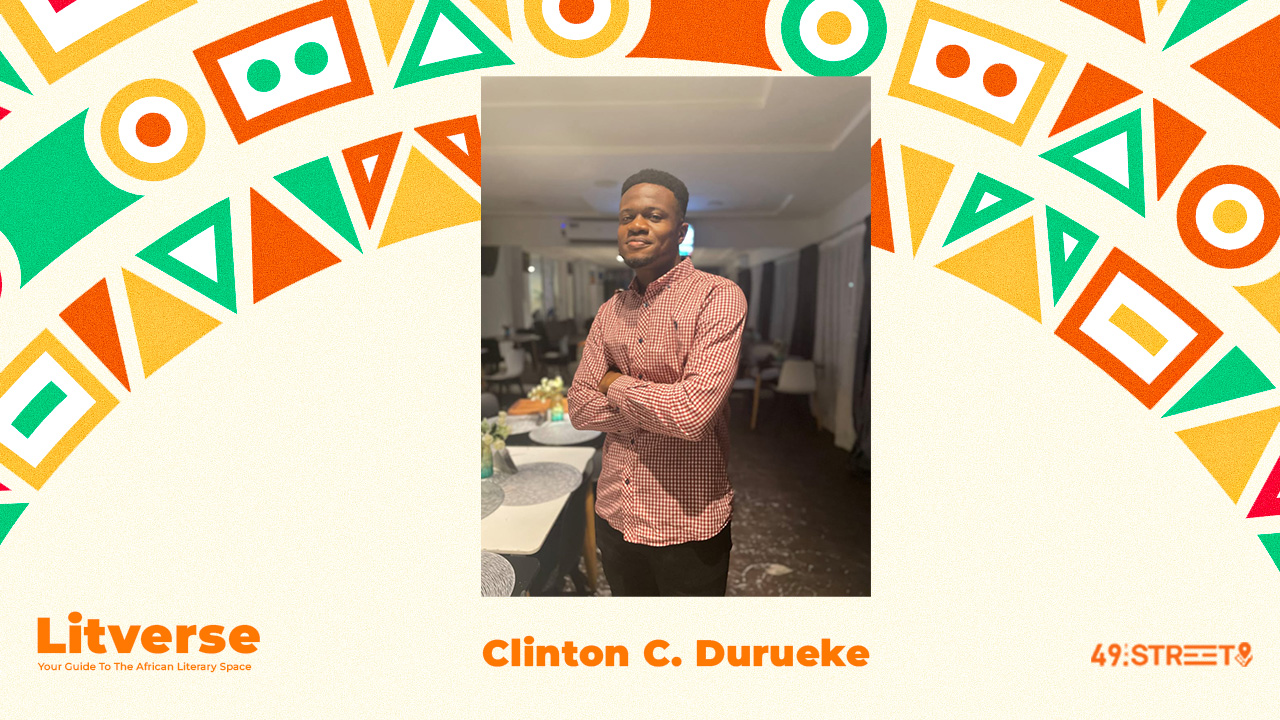Clinton C. Durueke is a writer, lawyer, part-time Youtuber and unapologetic D.C. fanboy who treats words and his literary works as time capsules he can go back to examine. In this 49th Litverse, he talks about how he started writing at 6 and how writing has been his constant companion despite its different forms.
If you could describe yourself in one sentence, what would that sentence be?
Clinton C. Durueke: Okay, this is tough. I’d say I’m a daydreamer committed to telling the best stories possible and living the most pristine life imaginable.
And expanding on that, who is Clinton, the writer, the lawyer?
Clinton C. Durueke: Ah. Clinton, the writer and the lawyer, is a young man who has been torn between two virtually irreconcilable worlds for the past five years. It has been one hell of a battle, albeit with a price worth fighting for.
The law! When did you start writing? And why?
Clinton C. Durueke: I started writing in general at age 6. In a nutshell, I adored storytelling. There’s just something poignant about having your spin on the human condition, whether it’s through a novel, short story, poem, or song.
It helped me make sense of life, and it still does. Now, more than ever.
At the age of 6? That’s impressive.
Clinton C. Durueke: Thank you.
I take it your family knows about your literary endeavours?
Clinton C. Durueke: That’s right. Not that I’m sad about it, but they don’t exactly know or read my projects, keep track and all. They just know that I write.
What’s it been like, writing for so long? How has your writing evolved with you?
Clinton C. Durueke: It has been intriguing and richly rewarding. I have experimented a couple of times and I’ve done well to diversify my craft. Poetry anthologies did not really strike me as a channel for expression until I was 15, and I’ve gone on to write three in the space of four years. I also started writing articles, submitting for magazines and all, at respective points. Visibility is key in this profession.

Yes, my writing has evolved. In recent years, I’ve paid much more attention to detail and it reflects how vividly I perceive life. I have also become more willing to craft morally ambiguous characters in my works.
Essentially, I have learnt so much over the years, and I cannot wait for what the next phase of my writing career holds.
Interesting. And now, what is writing like for you?
Clinton C. Durueke: To say the least, writing is a gratifying art form. It’s one of the easiest and most difficult endeavours to pull off, at the same time. It helps me make much more sense of life and put a lot of things in perspective, which other people can relate to. Over the years, writing (particularly poetry) has served as a means through which I crystallise stages of my life as postcards for the future. It has made me more introspective, more discerning, more human.
What do you hope to feel when you look back at your present work?
Clinton C. Durueke: That’s right. You see, I reflect on the past a lot. The “good times”, so to speak. I listen to old songs, and I cannot help but think about how life was when they dropped, as well as the emotions I felt when I first experienced them.
In like manner, I want to derive as many positive emotions as possible from my recent works when I look back in the years to come. I want to feel a huge sense of satisfaction that these projects have aged well.
Nice nice. So, you write poetry and also write prose; which one’s your favourite?
Clinton C. Durueke: Ah, big problem. A father of multiple children can refrain from openly stating his preference, no? I love both in almost equal measure.
Of course, but just whisper it in my ears.
Clinton C. Durueke: These days, it’s poetry. But Prose is the firstborn 😭
I understand lol. You’re a law student. Does your writing influence your academics or vice versa?
Clinton C. Durueke: I’d say my writing influences my academics more than the latter. To say the least. Just that I have to modify my surreal creative cap to keep my GPG.P.rom going where I no know.
So real. Speaking of influences, who are your biggest ones?
Clinton C. Durueke: It’s pretty straightforward, actually, because I don’t read so many books. My core influences—or at least, the writers I admire—are Dan Brown, Buchi Emecheta, Chimamanda Ngozi Adichie. I like Dan Brown’s larger-than-life, realistic approach to his stories. For Buchi Emecheta, Chimamanda Ngozi Adichie, it has to be how earnest they are.

I must also give props to my friend and close associate, T.J Martins. Above all, it would be his insane work ethic.
T.J Martins, the 22-year-old who has written 10 books, and counting.
T.J.’s work ethic is incredible. How’s yours? And, by extension, your writing process?
Clinton C. Durueke: My work ethic is more laid back. I like to take my time on anything I’m doing, partly to yield the best outcome and partly to accommodate other demands of life.
As for my writing process, in-depth planning is essential. I spent seven months planning my latest poetry anthology, Eureka, before putting pen to paper. In addition, I am more of an edit-on-the-go person than a first-draft or second-draft person. I am comfortable writing at any period of the day, but I probably have a slight preference for daytime. I also like writing with music, more often than not.
Seven months of planning? How did you not get bored?
Clinton C. Durueke: Bored ke? It got more interesting as time passed.
Teach me your ways. You said you don’t read a lot of books; how is it like being a writer who doesn’t read a lot?
Clinton C. Durueke: More often than not, I feel like a fraud. It’s only proper for a writer to read widely and broaden one’s perspective.
Then again, I console myself with past glory (once a bibliophile, always a bibliophile; don’t kill me) and the fact that I take my time whenever I pick up a book to read. I hope to fully repent of my sins in the near future, anyway.
You’re pretty active in the African literary space, what do you think about it in general?
Clinton C. Durueke: The course is 20k boss. I think the African literary space is vibrant and exciting. Personally, I have not even scratched the surface. Contemporary African authors are conscious of their role in showing all shades of Africa and not just what the wider world has come to expect from us. We literally just have to keep doing what we are doing, in addition to building more bridges among ourselves.
How do you deal with creative block?
Clinton C. Durueke: Very simple. I give it time while consuming other art forms, particularly poetry and music.
Speaking of music, what influence does music have on your work?
Clinton C. Durueke: A very profound effect, both on an intrinsic and a structural level.
On an intrinsic level, quality music sets me in the right mood. For my recently completed third novel, there were instances where I played some songs to immerse myself in specific emotions I sought to evoke.
On a structural level, I admire well-executed, cohesive albums and I feel driven to replicate that with my works. Permit me to make another reference to my latest poetry anthology, Eureka, which I approached as an album.
Care to expand on that second point?
Clinton C. Durueke: With Eureka, I developed an actual plot and ensured that each poem reflected at least one of the three central themes, such that there was no filler poem. I also made sure the poem titles spilled into each other.
Don Jazzy dey learn work. What should your fans expect from you in the next three to five years?
Clinton C. Durueke: Fans should expect a handful of projects from me in the next couple of years.
I intend to release at least two poetry anthologies (the first of which I have started writing, slated for a 2024 release) and three novels. I cannot specify a year for my next novel (I completed my third this year), but it will be in the Mystery/Thriller genre. I intend to stick to that genre moving forward.
I also intend to submit more of my works to literary magazines to build my presence in the Nigerian and African literary space. So, interesting times lie ahead.




